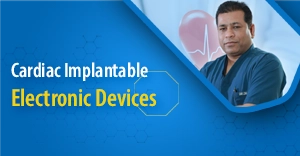Pacemaker Implantation at Medica
A pacemaker implantation is a type of surgery that involves the placement of a small electronic device in the chest (just below the collarbone) to stabilize slow electrical problems with the heart (arrhythmia). A pacemaker may be advised to ensure that the heartbeat does not slow to an unsafely low rate.
The Pacemaker aids in the regulation of heart rhythm and irregular heartbeats. Shortness of breath, dizziness, and total blackout are all symptoms of complete heart block.
The doctor inserts the device beneath the skin via a small pocket and connects it to the patient’s heart via fine wires. Some patients require a Pacemaker for a short period of time (for example, after a heart attack) to normalise the heart’s rhythm. For them, an external Pacemaker that is battery powered and remains outside the skin is attached (in form of a belt or otherwise).
Free Doctor Assessment
What is a Pacemaker?
It is a small device that assists your heart in beating consistently. It provides a small electric stimulation that aids in the maintenance of a steady heartbeat in various arrhythmia conditions. This allows the patient’s body to circulate oxygen and other vital nutrients from the blood vessels. Pacemakers, which are typically implanted, mimic the normal action of the heart’s electrical system and are made up of two parts:
Pulse Generator: A small metal container containing a battery and electrical circuitry that generates the electrical heart pulse.
Leads (Electrodes): These are insulated wires that are placed in the chamber(s) of the heart to deliver electrical pulses that help to regulate the irregular heart rate.
What is the Purpose of a Pacemaker?
Our cardiologists advise the implantation of a Pacemaker in case of the following conditions:
- Arrhythmia: The heart has a specific rhythm. This rhythm allows the flow of blood in the body. In the case of arrhythmia, the heart loses its normal rhythm. The heartbeat may be fast, slow, or completely irregular. A Pacemaker helps to normalize the heart rhythm.
- Heart failure: In heart failure, the heart cannot perform pumping functions. It can be due to several reasons, such as high blood pressure, damage to muscles of the heart, and arrhythmia. A Pacemaker helps the heart to function properly in patients with a history of heart failure.
- Congenital Heart Conditions: These diseases are present in patients by birth. They cause blockage in the heart. It results in abnormal heart rhythm. The doctor may suggest the patients for Pacemaker implantation in such cases.
- Other Diseases: Several other conditions require Pacemaker implantations.
These diseases are:
- Cardiomyopathy: In this disease, there is a reduction in the functioning of heart muscles.
- Pericarditis and Myocarditis: In pericarditis, there is an inflammation in the surrounding layer of the heart. In myocarditis, there is inflammation in the heart muscles. Both these conditions may require Pacemaker implantation.
- Sarcoidosis: In this disease, inflammatory cells grow and collect in various vital organs. If they grow in the heart, they may affect its functioning. In some cases of cardiac sarcoidosis, the doctor may suggest Pacemaker implantation.
- Hypothyroidism: In this condition, there is no or lower release of the thyroxine hormone. Complications due to hypothyroidism affect heart functioning. One of the treatments for this condition is Pacemaker implantation.
- Systemic sclerosis: In this disease, there is increased synthesis and collection of collagens in several organs. It may also affect the heart. In such cases, the doctor may suggest Pacemaker implantation.
What are the Various Types of Pacemakers?
There are the following types of Pacemakers:
Single Chamber Pacemakers: These are the simplest Pacemakers. There is only one lead in these Pacemakers. The doctor connects the lead to only a single chamber of the heart. In most cases, the doctor joins the right ventricle with the lead.
Dual-Chamber Pacemakers: These Pacemakers have two leads. These two leads attach to the right auricle and right ventricle. Dual-chamber Pacemakers manage the contraction pace of both the right auricle and right ventricle.
Three Lead Pacemakers: These Pacemakers have three leads. These leads connect to the right ventricle, left ventricle, and right auricle. The doctor implants this Pacemaker when there is no rhythm among both sides of the heart. These Pacemakers normalize the rhythm of both sides of the heart.
What Tests do Doctors Perform Before Pacemaker Implantation?
The doctor performs some tests before Pacemaker implantation. These tests help the doctor to determine the cause of irregular rhythm. Some of the tests are:
- ECG: This test evaluates the electrical function of the heart. Through ECG, the doctor finds whether the heart is functioning too slowly, too fast, or there is no activity.
- Holter monitoring: This device continuously records the heartbeats. The benefit of this device is that it helps to diagnose conditions that occur at an irregular time. The doctor may advise the patients to wear the device at least for 1-2 days.
- Echocardiogram: This method helps to analyse the complete structure of the heart. This test also provides details about the blood flow and functioning of heart valves.
- Stress Tests: The doctor performs the stress test to find the performance of the heart during exercise. The doctor asks the patient to run on a treadmill. The doctor then takes the ECG to find any problem in the heart.
Every year, almost 1 million cardiac pacemakers are installed around the world
Seek help from an expert
Call NowWhat are the Risks of Having a Pacemaker?
As with other surgeries, patients with Pacemaker implantation method may have the following risks:
- Movement of the Pacemaker
- Swelling, inflammation, and pain at the site
- Formation of blood clots
- Nerve injuries
- Accumulation of blood between chest wall and lungs
- Falling (collapsing) of the lungs
Treatment at Medica
Each year, our team of renowned cardiologists and surgeons diagnose and treat over hundreds of adults and children. We are also giving our best to provide treatment for highly complicated cases.
Medica’s Cardiology Department routinely performs complex cardiac procedures not only like Permanent Pacemaker Implantation, but our surgeons are also skilled in performing other types of complex heart surgeries such as:
- Mitral-Valvuloplasty
- Cardiac Resynchronisation Procedures
- AICD (Implantable Cardioverter-Defibrillator) Implantation
Our experts also provide medical procedures for congenital ailments such as Coarctation of Aorta, Stenting and PDA Closure.

Minimally Invasive
Surgery

World Renowned
Experts
EMI Facility
Available










